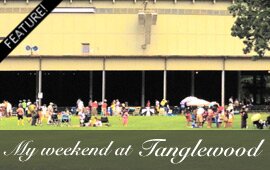 I’M late with a report on ‘s recent production of Hindemith’s The Long Christmas Dinner, based on a libretto by Thornton Wilder. I haven’t caught up with OperaHub in a while, whose youthful, witty, intelligent, and savvy spirit manages to make opera pretty damn cool and accessible. Their productions are free (not to say they don’t require your support) and, perhaps as a consequence of that, fleeting. Running typically just for a weekend, their shows fill small houses with local opera geeks and kids alike. These are small shows, but each feels like a triumph and is put on with impeccable standards.
I’M late with a report on ‘s recent production of Hindemith’s The Long Christmas Dinner, based on a libretto by Thornton Wilder. I haven’t caught up with OperaHub in a while, whose youthful, witty, intelligent, and savvy spirit manages to make opera pretty damn cool and accessible. Their productions are free (not to say they don’t require your support) and, perhaps as a consequence of that, fleeting. Running typically just for a weekend, their shows fill small houses with local opera geeks and kids alike. These are small shows, but each feels like a triumph and is put on with impeccable standards.
The Long Christmas Dinner is pushed along quickly by the rapid succession of births and deaths in Wilder’s Libretto. Sometimes light, though not very comic, the opera traces an upper middle class Midwestern family dynasty through the generations at, as the title suggests, one long Christmas Dinner. It’s actually a lot of Christmas dinners squeezed into one. We’re just not privy to what happens during the rest of the year.
The opera is kind of a philosophical one liner in its juxtaposition of holiday pleasantries and talk of the weather with heavy stuff like life & death–a storkish nanny delivers new babies to the dining room in an old pram and aging characters eventually make their way to a doorway that symbolizes death. A son eventually takes the place of his mother as the elderly, absent-minded diner and once dead grandparents return to the dining room in new costumes as grandchildren. There is of course more than a little tragedy over the 90 years of Bayard family history the opera traces, but it’s clear that the libretto’s chief concern is not infant mortality or young men going off to war and dying, but the stifling cycle of a wealthy Midwestern family and it’s father’s-shoes-filling sons, endless dinner table conversations, and the role of the family business (simply “the firm”) as a kind of invisible guest of honor at the dinner table.
The characters are, in fact, obsessed with time. While most of the recitative is pleasantries about the weather, most of the actual singing, to a score that stomps along with punches of atonality, is introspection on how long things are or have been.
Eventually, new generations break what seemed might be an endless cycle. Some seek to escape their fate, though not necessarily with triumph or success. Some even seem to have moments when they see beyond their limited temporal perspective and get a sense of the sort of time lapse view that we have. And sometimes the world outside of the Bayard’s little comfortable kingdom intervenes.
But despite all of this, there is no end for the Bayards, even though this particular ninety-year Christmas dinner might be finishing its final course, as the last occupants of an old house age towards that one particular dining room exit from which there’s no return. Turns out the family has simply set up shop in another town, where we can assume the forces of the libretto–death, tragedy, birth, repetition, and a little rebellion–can begin a new cycle.



